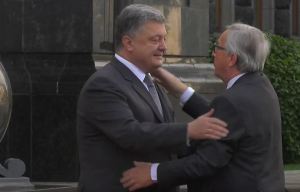nsnbc : Ukraine slated 890 state-owned companies including many cultural institutions and key export companies for privatization. Ukraine’s Ministry of Economic Development and Trade has published the list on its website. The privatizations are at least in part based on conditions linked to IMF loans. The list includes the Odesa Portside Chemical Plant, as well as renown cultural institutions like the National Circus of Ukraine, six regional circuses, the Dovzhenko Film Studios, Ukrainian Documentary Film Studios, Ukrtelefilm Studio, UkrSpirt, Oshchadbank, and thejoint stock company Turboatom. The privatizations are set to be completed between 2017 and 2020. The privatization spree has already been marred by corruption scandals and murder.
While some of the cultural institutions never brought profits to Ukraine, many believe that the Odesa Portside Chemical Plant has been mismanaged so as to sell it far below its potential market value. Concerning cultural institutions, many are believed not to survive “privatization”. Oleksandr Salnikov, the lawyer of the National Circus Company of Ukraine told reporters that the circus never brought any profit to the state. He added that he doesn’t think any businessmen would be interested in buying the National Circus Company as a possible business.
Ukraine’s Economy Ministry reported that there are 3,460 state-owned enterprises in Ukraine. On July 28 the Ministry stated that the state has proved itself as “ineffective owner and manager of the companies that operate in competitive markets. In 2016 the Ministry stated that more than 1,600 state-owned enterprises were not working. In 2012 that number was reported as 1,367. The Ministry also reported that it, in 2016 alone, had registered 1,186 loss-making companies. In 2017, more than Hr 537 million (about 17.5 million euro) was allocated for financial support of state owned companies of cultural sector only.
The Ministry said only strategically important state-owned companies and companies of strategic importance forfor Ukraine’s economy would stay under government control. Others would be passed in concessions, liquidated or sold to private investors. Besides the above mentioned enterprises, the list also includes sea and river ports, jewelry factories and many others.
The Ukrainian government has broadened the list of enterprises to be sold to private investors by the end of August, as part of the memorandum with the International Monetary Fund (IMF) signed in April. The IMF has disbursed about half of the $17.5 billion credit package that expires at the end of 2018, but stalled reforms have stalled the lending. The IMF insisted Odesa Port Side Plant must be privatized until the end of 2017.
 Ironically, one of the conditions for IMF and EU loans was not met – the establishment of a transparent and independent anti-corruption court. However, in July European Commission President Jean-Claude Juncker agreed that the not-so-independent anti-corruption court created by the Ukrainian government was the next best thing and good enough. The National Anti-Corruption Bureau of Ukraine (NABU) and an alliance of other NGOs, on July 13 – 14, issued statements lambasting Juncker for backtracking on the EU and IMF requirement that Ukraine set up independent anti-corruption courts.
Ironically, one of the conditions for IMF and EU loans was not met – the establishment of a transparent and independent anti-corruption court. However, in July European Commission President Jean-Claude Juncker agreed that the not-so-independent anti-corruption court created by the Ukrainian government was the next best thing and good enough. The National Anti-Corruption Bureau of Ukraine (NABU) and an alliance of other NGOs, on July 13 – 14, issued statements lambasting Juncker for backtracking on the EU and IMF requirement that Ukraine set up independent anti-corruption courts.
According to the State Property Fund website, the Odessa Port Side Plant, UkrSpirt, oblenergos (state energy suppliers), public joint-stock corporation Turboatom and others must be sold only through an auction or a transparent competition. “Privatization of major enterprises is impossible without the joint efforts of all branches of government. The State Property Fund will do its best to fasten the privatization and increase the flow of funds in the state budget,” the message reads. And of course, anyone who suspects corruption or lack of transparency may try the new, not-so-independent anti-corruption courts that were approved with blessings from Juncker.
Explaining the reasons for the privatization of Ukraine’s cultural institutions, and by implication justifying their death sentences, the Ministry of Economic Development and Trade monitoring said Dovzhenko Film Studios lost Hr 3 million for the state in 2015-2016. Ukrtelefilm Studio lost more than Hr 2.5 million in the same period. The Lviv State Circus lost Hr 1.6 million and the Zaporizhzhia Circus Hr 1.4 million in 2015-2016. The Ministry appears to have no published data about the financial performance of the National Circus of Ukraine. However, “Those enterprises can be sold to private investors or passed in the communal ownership,” the ministry said. Moreover, the Ministry added that circuses and cinema studios were included in the privatization list as “recommended.”
The privatization and sale of the national Circus and other enterprises may be challenged because current Ukrainian legislation doesn’t allow to sell the objects with national status to private hands. However, the Ministry stated that the Cabinet had ordered the Ministry of Economic Development and Trade and State Property Fund to broaden the list of state owned enterprises and represent the new privatization addition (2017-2020) to the Cabinet for approval.
The privatization spree has already been marred by corruption scandals and murder.
The Odesa Portside Chemical Plant is one of the largest state producers of ammonia, urea, methanol and other chemicals, is located on 250 hectares of land near the city of Yuzhny in Odesa (Odessa) Oblast. In December the plant officially stopped its work due to the lack of finances and announced it was going to lease its entire complex for rent.
The enterprise was mostly export-oriented. 85 percent of products were exported. The plant usually sells its products to 30 countries of the world. The plant was meant to be the first big privatization since 2015, with a minimum bid of $500 million. However, in July 2016, the government brought down the price to $250 million, but the privatization failed again due to the lack of bids from the potential investors, State Property Fund has reported. Although about 10 potential investors showed interest. Critics claim the plant was willfully mismanaged to deflate the price. In the latest memorandum signed in April, IMF insisted that the Odesa Port Side Plant must be privatized by the end of 2017. The next auction will take place in December. State Property Fund head Ihor Bilous told the journalists that the new price would be about $150 million.
In July 2016, the National Anti-Corruption Bureau of Ukraine detained the head of the Odesa Portside Plant Supervisory Council Sergei Pereloma and his deputy Mykola Shchurikov. Both were suspected of Hr 250 million embezzlement during the illegal procurement of natural gas for the plant. Three days later both were sentenced to 60 days in prison. However, on Aug 1, 2016, the Court of Appeal of Kiev canceled the sentence. Pereloma still works as a deputy head of the joint stock company Naftogaz Ukraine. Shchurikov won the case against “NABU’s illegal arrest” in court and has since returned to his job in Odesa Port Side plant supervisory council.

The value of UkrSpirit is expected to rise dramatically, among others, because of the free trade agreement between Canada and Ukraine and Ukraine’s closer ties to the European Union.
Viktor Pankov, the ex-deputy head of the state-owned alcoholic beverage producer UkrSpirt, was shot dead in one of the districts of the Ukrainian capital Kiev on May 30. The assassin shot Pankov four times in his back. Police stated that his murder with Pankov’s professional activity.
Interior Ministry advisor Anton Gerashchenko told reporters that Pankov was assassinated because of his work in UkrSpirt. He said : “For the last 10-15 years Pankov was deeply connected with this challenging state enterprise, that was meant to work profitably for Ukrainian people, but instead constantly works in the shade”. The investigation into Pankov’s murder has not let to any arrest. In 2012, the Anti-Monopoly Committee of Ukraine fined UkrSpirt Hr 200 million for intentional and illegal overpricing of ethanol.
Many Ukrainian and international observers don’t expect this latest round of privatizations to be more transparent and less criminally motivated and informed than the wave of privatizations after the collapse of the Soviet Union that led to the rise of powerful new oligarchies in Russia, the Ukraine and other former Soviet republics.
CH/L – nsnbc 04.08.2017
Source Article from https://nsnbc.me/2017/08/04/ukraine-to-privatize/
 RSS Feed
RSS Feed















 August 4th, 2017
August 4th, 2017  Awake Goy
Awake Goy 











 Posted in
Posted in  Tags:
Tags: 













